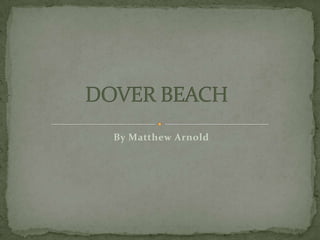Dover beach
- 2. Matthew Arnold (1822 –1888) was a British poet and cultural critic who worked as an inspector of schools. And he was also one of the chief Victorian poets. Matthew Arnold has been characterized as a sage writer, a type of writer who chastises and instructs the reader on contemporary social issues.
- 3. Matthew Arnold wrote "Dover Beach" during or shortly after a visit he and his wife made to the Dover region of southeastern England, the setting of the poem, in 1851. They had married in June of that year. A draft of the first two stanzas of the poem appears on a sheet of paper he used to write notes for another work, "Empedocles on Etna,"
- 4. The town of Dover is closer to France than any other port city in England. The body of water separating the coastline of the town from the coast of France is the Strait of Dover, north of the English Channel and south of the North Sea.
- 5. The poet/persona uses first-, second-, and third-person point of view in the poem. Generally, the poem presents the observations of the author/persona in third-person point of view but shifts to second person when he addresses his beloved, as in Line 6 (Come), Line 9 (Listen! you), and Line 29 (let).
- 6. Then he shifts to first-person point of view when he includes his beloved and the reader as co-observers, as in Line 18 (we), Line 29 (us), Line 31 (us), and Line 35 (we).
- 7. He also uses first-person point of view to declare that at least one observation is his alone, and not necessarily that of his co- observers. This instance occurs in Line 24: But now I only hear. This line means But now I alone hear.
- 8. The person addressed in the poem— Lines 6, 9, and 29—is Matthew Arnold's wife, Frances Lucy Wightman. However, since the poem expresses a universal message, one may say that she can be any woman listening to the observations of any man.
- 9. Arnold’s central message is this: Challenges to the validity of long-standing theological and moral precepts have shaken the faith of people in God and religion.
- 10. In Arnold’s world of the mid-1800's, the pillar of faith supporting society was perceived as crumbling under the weight of scientific postulates, such as the evolutionary theory of English physician Erasmus Darwin and French naturalist Jean-Baptiste Lamarck. Consequently, the existence of God and the whole Christian scheme of things was cast in doubt.
- 11. Arnold, who was deeply religious, lamented the dying of the light of faith, as symbolized by the light he sees in “Dover Beach” on the coast of France, which gleams one moment and is gone the next. He remained a believer in God and religion, although he was open to—and advocated—an overhaul of traditional religious thinking.
- 12. “Dover Beach” is a poem with the mournful tone of an elegy and the personal intensity of a dramatic monologue. Because the meter and rhyme vary from line to line, the poem is said to be in free verse--that is, it is unencumbered by the strictures of traditional versification. However, there is cadence in the poem, achieved through the following:
- 13. Arnold uses a variety of figures of speech, including the following examples. Alliteration to-night , tide; full, fair (Lines 1-2); gleams, gone; coast, cliff; long line; which the waves; folds, furled Assonance: tide, lies; Paradox and Hyperbole: grating roar of pebbles
- 14. Metaphor: which the waves draw back, and fling (comparison of the waves to an intelligent entity that rejects that which it has captured) Metaphor: turbid ebb and flow of human misery (comparison of human misery to the ebb and flow of the sea) Metaphor: The Sea of Faith (comparison of faith to water making up an ocean) Simile: The Sea of Faith . . . lay like the folds of a bright girdle furled (use of like to compare the sea to a girdle)
- 15. Metaphor: breath of the night-wind (comparison of the wind to a living thing) Simile: the world, which seems / To lie before us like a land of dreams (use of like to compare the world to a land of dreams) Anaphora: So various, so beautiful, so new (repetition of so) Anaphora: nor love, nor light, / Nor certitude, nor peace, nor help for pain (repetition of nor)
















